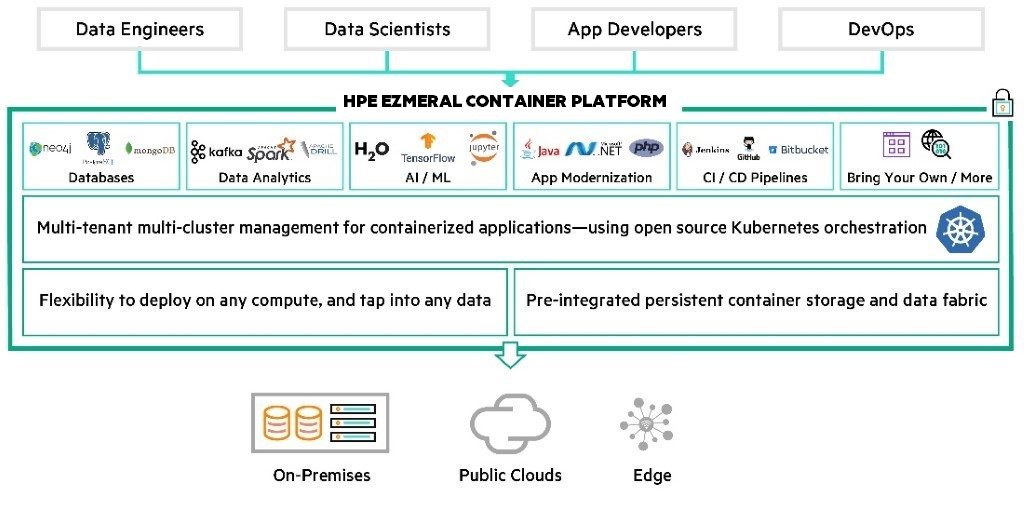# Introduction
This document describes the steps required to deploy the HPE Ezmeral Container Platform environment running on HPE Synergy. It is intended to be used in conjunction with Ansible playbooks and Python scripts found at https://github.com/hewlettpackard/hpe-solutions-hpecp.This document was created using HPE Ezmeral Container Platform 5.0, and the detailed documentation is available at http://docs.bluedata.com. This document should be reviewed in its entirety and the installation user should understand all prerequisites and procedure prior to installation. It is also recommended that the installation user reviews the HPE Ezmeral Container Platform installation process as described in http://docs.bluedata.com.
NOTE
Hewlett Packard Enterprise plans to update this document over time with enhancements to deployment methodologies as well as new software versions, features, and functions. For the latest document, see https://hewlettpackard.github.io/hpe-solutions-hpecp/.
# HPE Ezmeral Container Platform
The HPE Ezmeral Container Platform is a unified container platform built and designed for both cloud-native applications and stateful analytics applications running on any infrastructure either on-premises, in public clouds, in a hybrid model, or at the edge.
HPE Ezmeral Container Platform installs as a software layer between the underlying server infrastructure and the Big Data distribution, AI/ML libraries, and applications. The use of Docker is completely transparent and HPE Ezmeral Container Platform customers benefit from the greater agility and bare metal performance due to the lightweight nature of the containers. Customers can leverage the flexibility of the containers to simplify development for DevOps, CI/CD pipelines, and application modernization across hybrid cloud deployments.
NOTE
The deployment guide was developed using HPE Ezmeral Container Platform 5.0. The screenshot of the application will not show HPE Ezmeral Container Platform. However, the rest of the document will be using the HPE Ezmeral branding.
Figure 1 shows the high-level HPE Ezmeral Container Platform architecture.

Figure 1. HPE Ezmeral Container Platform architecture
# HPE Ezmeral Container Platform Controller
HPE Ezmeral Container Platform Controller is installed and configured on 3x HPE Synergy compute nodes. HPE Synergy Storage Module is used for ephemeral node storage. Platform-level high availability functionality is enabled to protect the HPE Ezmeral Container Platform against the failure of the Controller host. Platform-level high availability requires designated two worker hosts, such as Shadow Controller and Arbiter.
# Gateway Load Balancer
Gateway server provides a connection to HPE Ezmeral Container Platform managed Kubernetes cluster services. All public service end-points in KubeDirector managed Kubernetes clusters will be exposed via HPE Ezmeral Container Platform Gateway re-mapped ports. Redundancy for Gateway hosts is provided by creating two sets of gateway servers by mapping multiple Gateway host IP addresses to a single hostname. This ensures that there is no single point of failure for the Gateway host. When this is done, then either the DNS server or an external load balancer will load-balance requests to the hostname among all the Gateway hosts on a round-robin basis. Hewlett Packard Enterprise has implemented gateway nodes on two (2) HPE Synergy 480 Gen10 Compute Modules.
NOTE
HPE Ezmeral Container Platform Gateway load balancer (LB) nodes can be deployed on a virtual machine.
# HPE Ezmeral Data Fabric
The HPE Ezmeral Container Platform will install and configure the persistent data fabric for AI and analytics and Kubernetes (K8s) workload. All applications running in containers will be able to natively access data across the fabric. This data fabric is a distributed file and object store from MapR that manages both structured and unstructured data. It is designed to store data at an exabyte scale, support trillions of files, and combine analytics and operations into a single platform. It supports industry standard protocols and APIs, including POSIX, NFS, S3, and HDFS.
# Kubernetes cluster
This consists of a bare metal Kubernetes cluster built on top of HPE Synergy 480 Gen10 Compute Modules and HPE Synergy D3940 Storage that can manage multiple versions of Kubernetes clusters with multitenant container isolation and data access for any workload from edge to core to cloud. The deployment of Kubernetes cluster is achieved using the proven HPE Ezmeral Container Platform software.